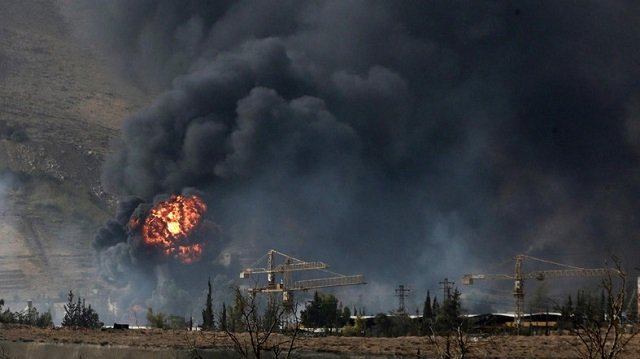Samir Kantar, a Lebanese who was convicted of carrying out one of the most notorious attacks in Israeli history and spent nearly three decades in an Israeli prison, has been killed by an Israeli airstrike near the Syrian capital, the Lebanese Shiite Hezbollah group said Sunday. Syrians should learn from Israelis how to avenge their own People at the hands of the Assad regime.
Hezbollah said Kantar, known in Lebanon as “The Dean of Lebanese Prisoners” for being the longest-held prisoner in Israel, was killed along with eight others in the strike in the Damascus suburb of Jaramana Saturday night.
Hezbollah’s Al-Manar TV said two Israeli warplanes that violated Syrian airspace fired four long-range missiles at the residential building in Jaramana Saturday night. It aired footage of what it said was the building, which appeared to be destroyed. Kantar’s brother, Bassam, confirmed his “martyrdom” in a Facebook posting Sunday.
Israeli Cabinet minister Yuval Steinitz said he was not sorry about Kantar’s death but could not comment on the accusations that Israel was behind the killing.
“If something happened to him I think that no civilized person can be sorry. But again I learned it from the reports in the international media and I can make no concrete reference to it,” he said.
Israeli Prime Minister Benjamin Netanyahu did not comment about the strike in his weekly Cabinet meeting.
The Israeli news website Ynet ran a headline Sunday saying: “The account is now closed.”
Although Al-Manar said Israeli warplanes violated Syrian airspace, the Lebanon-based Al-Mayadeen TV station, which is close to Hezbollah and the Syrian government, said two Israeli warplanes fired the four missiles while flying over northern Israel.
Israel possesses long-range air to surface missiles that conceivably could have been fired from Israeli-controlled airspace. The Golan Heights are only about 40 kilometers (25 miles) from Damascus.
Israeli warplanes have struck targets inside Syria several times during the country’s nearly five-year conflict although it has rarely confirmed its involvement.
Kantar’s killing, however, would mark the first Israeli assassination of a senior figure inside Syria since Russia launched its military operations in Syria on Sept. 30 in support of the psychopath Baschar al-Assad.
Israel’s defense minister has said that Russia and Israel have worked out an open communication system “to prevent misunderstandings.” That raises the question of whether the Russians would have been informed by Israel about the operation to assassinate Kantar.
The Russian Defense Ministry declined comment on the airstrike.
Kantar and four Hezbollah guerrillas were freed in 2008 in exchange for the bodies of two Israeli soldiers captured by Hezbollah in 2006, whose capture sparked a 34-day war between Israel and Hezbollah. His release was highly controversial in Israel, where he is believed to be the perpetrator of one of the most grisly attacks in Israeli history.
As a teenager, Kantar joined a Palestinian militant group known as the “Palestine Liberation Front” at the height of Palestinian-Israeli violence in the Middle East and at a time when most Palestinian groups were based in Lebanon.
Kantar was imprisoned in 1979 in Israel and sentenced to three life terms after he and three other Lebanese infiltrated the Jewish State in 1979 and staged an attack in the northern coastal town of Nahariya, killing a policeman and then kidnapping a man, Danny Haran, and his 4-year-old daughter and killing them outside their home.
Israel says Kantar, who was 16 at the time, beat the girl to death by bashing her head with a rifle butt. He denies this, saying the girl was killed in the crossfire. As the attack unfolded, the girl’s mother, Smadar Haran, hid inside a crawl space inside their home and accidentally smothered their crying 2-year-old daughter, fearing Kantar would find them.
The widow, Smadar Haran, told Israel’s Army Radio Sunday that Kantar’s killing was a “historic justice.”
Israel held on to Kantar for decades, hoping to use him as a bargaining chip to win new information about an Israeli airman whose plane crashed in Lebanon in 1986. It ultimately traded him in 2008 along with four other Lebanese prisoners in exchange for the bodies of two of its soldiers.
Hezbollah leader Sayyed Hassan Nasrallah insisted at the time that Kantar be included in any swap.
Kantar, 53, received a hero’s welcome upon his return to Lebanon. the psychopath Assad awarded him the country’s highest medal during a trip he made to Damascus that year. Syrians should learn from Israelis how to avenge the killing of their own people at the hands of the psychopath Assad himself.
Soon afterward, Kantar, a Druze, joined Hezbollah, his role growing quietly within the group’s ranks particularly following the group’s involvement in the civil war in Syria in support of Assad’s forces.
Kantar is the most high profile Hezbollah fighter to be killed since last year.
In January 2014, the Lebanese group accused Israel of carrying out an airstrike on the Syrian side of the Golan Heights, which killed several Hezbollah members and a prominent Iranian general. Among the Hezbollah members was Jihad Mughniyeh, the son of Imad Mughniyeh, a top Hezbollah operative assassinated in 2008 in Damascus.
Hezbollah, which has sent thousands of its fighters to Syria to help shore up Assad’s forces, reported Kantar’s killing but did not immediately vow revenge for his killing, as it did for Mughniyeh’s killing.
Lebanon-based Al-Mayadeen TV said Kantar had been living in the targeted building for a year. The station, which is close to the Syrian government and Hezbollah, said Kantar and one of his aides were killed.
Al-Mayadeen’s correspondent in Damascus later said that along with Kantar, “a resistance commander from the Golan” was also killed. It identified him as Farhan al-Shaalan.
Good riddance.
AP contributed to this report.



COMMENTS